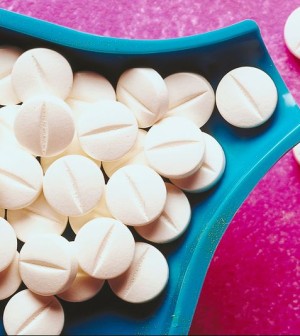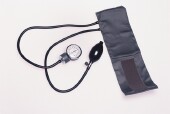- Could Your Grocery Store Meat Be Causing Recurring UTIs?
- Are You Making This Expensive Thermostat Error This Winter?
- Recognizing the Signs of Hypothyroidism
- 10 Strategies to Overcome Insomnia
- Could Artificial Sweeteners Be Aging the Brain Faster?
- Techniques for Soothing Your Nervous System
- Does the Water in Your House Smell Funny? Here’s Why
- Can a Daily Dose of Apple Cider Vinegar Actually Aid Weight Loss?
- 6 Health Beverages That Can Actually Spike Your Blood Sugar
- Treatment Options for Social Anxiety Disorder
Tight Blood Sugar Control Doesn’t Prevent Strokes in Diabetics: Study


A six-year study of people with type 2 diabetes found that intensively lowering blood pressure had a long-lasting effect in preventing heart attacks, strokes and deaths. But intensive blood sugar control didn’t produce those benefits, the researchers found.
For the study, investigators followed nearly 8,500 participants of a completed diabetes trial. Some participants had had their blood pressure and blood sugar levels strictly controlled, while others had received standard care. The researchers wanted to assess the long-term effects of the intensive control, which ended when the trial concluded.
“One of the points of doing this study was to see if lowering blood sugar for five years might, down the track, translate into protection against stroke and heart attack — it didn’t,” said researcher Dr. Bruce Neal, a professor of medicine at the University of Sydney in Australia.
Diabetes is a risk factor for heart disease and stroke. And many diabetics have other risk factors for heart attack and stroke, such as high blood pressure, high cholesterol and excess weight, according to the U.S. National Institute of Diabetes and Digestive and Kidney Diseases.
The original study — dubbed the ADVANCE study — “showed clearly that you got these great benefits from blood pressure reduction and you also got some benefit from blood sugar lowering,” Neal said.
The unanswered question, Neal said, was if intensive blood pressure and blood sugar control were stopped, would the benefits go away or last.
To find out, they stopped the intensive treatment, but continued to follow the trial participants for an additional 5.9 years.
Over that time, they did find a lasting benefit of intensively lowering blood sugar levels to 6.5 percent in preventing kidney disease, a common complication of uncontrolled diabetes, Neal said. “Probably the five years of treatment we gave them led to changes in the kidney that continued to protect people for many years after.”
Among patients who had their blood pressure reduced in the original trial to 135/75 mm Hg — considered intensive control — the benefit in reducing the risk of dying from a heart attack or stroke remained, although to a lesser degree, as time went by, Neal said.
“The implication is to continue to take blood pressure drugs if you want to get maximum protection,” he said.
The report was published in the Sept. 19 online edition of the New England Journal of Medicine to coincide with presentation of the findings at the annual meeting of the European Association for the Study of Diabetes in Vienna.
Dr. Simon Heller, a professor of clinical diabetes at the University of Sheffield in England, said it isn’t surprising that the benefit of intensive blood pressure control lasts beyond the period of intense control, although it may wane as the years go by.
His take on the study? “The main way to reduce heart attacks and strokes in people with type 2 diabetes is to treat increased blood pressure and to reduce cholesterol,” he said.
“Blood sugar lowering is not apparently very good at reducing heart attacks or strokes, although it is very effective in reducing the risk of nasty diabetic complications such as diabetic eye disease, nerve damage and most important of all, kidney damage,” Heller added.
In the trial, Diamicron MR (gliclazide) — an older medication — was the drug used most often to reduce blood sugar. This is in a class of drugs called sulfonylureas.
It’s possible, Neal said, that a newer diabetes drug might have a more beneficial effect in preventing heart attacks and strokes.
Dr. Joel Zonszein, director of the Clinical Diabetes Center at Montefiore Medical Center in New York City, agreed. “These newer drugs seem to be much more friendly in terms of heart attacks and strokes,” said Zonszein, who was not involved with the study.
“Maybe you didn’t see an improvement because patients were exposed to sulfonylureas, which have been associated with a high rates of death from heart attack and stroke,” he said.
Medications preferred today to lower blood sugar include Januvia (sitagliptin), Onglyza (saxagliptin), Tradjenta (linagliptin) and Nesina (alogliptin), Zonszein said.
More information
For more about type 2 diabetes, visit the American Diabetes Association.
Source: HealthDay
Copyright © 2026 HealthDay. All rights reserved.










